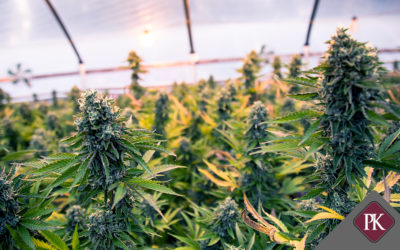A company’s biological assets are those that are living, such as livestock, crops, and plants. They are critically important to a cannabis business because the plants are the main source of all revenues and profits.
As the cannabis industry continues to grow, the number of mergers and acquisitions (M&A) and new investors entering the market are increasing as well, with many deriving from cannabis groups based in Canada. These foreign entities report their financial statements under International Financial Reporting Standards (IFRS), rather than accounting principles generally accepted in the United States of America (U.S. GAAP). International Accounting Standard 41 (IAS 41) requires companies to report their biological assets at fair market value less costs to sell. This is not a requirement under U.S. GAAP.
The cultivation process of cannabis, up to harvesting (planting, curing, growing), is classified as biological assets under IAS 41. At the point of harvest, the assets are then classified as inventory under IAS 2, which requires they be measured at the lower of cost or net realizable value. Accounting for the biological assets in accordance with IAS 41 is difficult and time consuming, and requires a considerable amount of judgment. In addition, many seed-to-sale software systems currently being used by the industry do not provide adequate information to properly value cannabis biological assets. Consideration must be given to the tools required to effectively value the cannabis plants.
When it comes to the value, IAS 41 provides a fair value hierarchy as follows:
- Hierarchy 1 – Price for the asset in an active market
- Hierarchy 2 – Recent transaction price for the asset if there is no active market
- Hierarchy 3 – Market prices for similar assets
- Hierarchy 4 – Sector benchmarks
- Hierarchy 5 – Present value of future cash flows expected to be generated from the assets
Generally speaking, Hierarchy 5 is the most appropriate method given lack of available information under the other hierarchies.
When estimating fair value of cannabis plants, here are some models to consider:
- Stage of growth
- Expected yields
- Expected costs to complete
- Market participant price
- Selling costs
- Cost per gram
- Mortality and waste
The numerous inputs complicate the process of determining the fair value of biological assets. Furthermore, financial statement note disclosures are extensive and often difficult to prepare. This can add substantial time and effort to the already difficult process of valuing cannabis plants.
At Price Kong, we understand the intricacies of the cannabis industry and valuing biological asses under IAS 41. Our services include evaluating your methodology, determining reasonable estimates and measurements of biological assets, and preparing financial statements under IFRS, with appropriate disclosures.
Please feel free to contact us at 602.776.6300 if you have questions or need additional information regarding IAS 41 or valuing biological assets.

TROY GRIFFITH, CPA, Audit Partner
602.776.6367 | tgriffith@pkcpa.com
Troy serves as the attest partner on all cannabis engagements. He earned his CPA license in 2013 and has worked in public accounting since 2009. Prior to joining Price Kong in 2014, Troy worked for BDO in Anchorage, Alaska, where he ran audits of numerous closely-held business and non-profits.
Troy has been instrumental in growing the firm’s Cannabis Services group. He was largely responsible for developing and implementing audit methodologies specifically tailored for the unique compliance and reporting issues cannabis businesses face. Troy is substantially involved in all cannabis client audits and has an intricate understanding of dispensary operations, controls, and metrics. He also works closely with the tax team and clients to consult on 280E allocations and methodologies.
Troy ensures all client financial reviews and audits are completed in accordance with required auditing standards and individual state compliance regulations. In addition to attest services, he consults with companies on unique GAAP rules and implementations, potential M&A transactions, IFRS reporting, due diligence requests, and operational controls.
As audit partner, Troy ensures all client financial reviews and audits are completed in accordance with required auditing standards and individual state compliance regulations. In addition to attest services, he consults with companies on unique GAAP rules and implementations, potential M&A transactions, IFRS reporting, due diligence requests, and operational controls.
Troy is a member of the Arizona Society of Certified Public Accountants (ASCPA) and the American Institute of Certified Public Accountants (AICPA). He is also actively involved in numerous cannabis and construction industry organizations, including the Arizona Dispensary Association.
ABOUT PRICE KONG
Price Kong was established in Phoenix in 1967. Since then, our team has grown to 50 professionals and includes seventeen CPAs. The depth of our audit and tax practices allows us to provide services to clients in numerous industries, of a wide-range of sizes, and with revenues ranging from $1 million to over $500 million.
Since 2011, Price Kong has been the leader in providing audit, tax and consulting services to businesses in Arizona’s cannabis industry, as well as those throughout the United States. Our professionals have spent 1,000s of hours collectively researching and studying this industry, and the complexities and nuances inherent to it. We have proprietary models, strategies, and processes that have been implemented at hundreds of cannabis businesses, saving them time and money.

